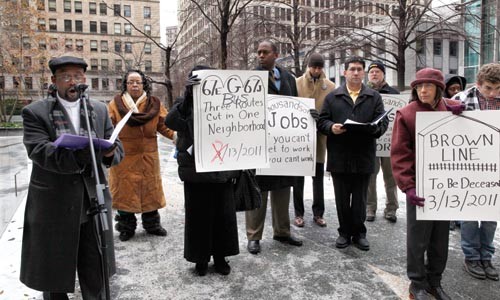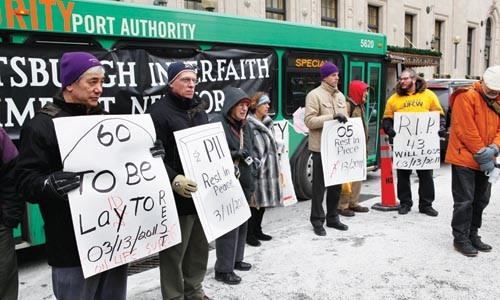The Port Authority of Allegheny County may have received a bailout to stave off huge service reductions, but the transit agency still faces a bumpy road ahead.
Faced with a $47.1 million budget shortfall, the Port Authority was bracing for a fare increase in January, followed by a 35 percent service reduction and layoffs for up to 540 employees in March. But on Dec. 2, just a week after the authority's board approved cuts that would have left 50 neighborhoods without any transit service, outgoing governor Ed Rendell announced that he'd "cobbled together" some $45 million from a discretionary fund to tide the agency over. In a 27-22 vote, the Southwestern Pennsylvania Commission narrowly approved transferring that money on Dec. 13.
But how much help, really, has the agency received? While Rendell's money reduces cuts and layoffs, the fare increase will still take effect. The agency has also been asked to stretch the money over 18 months, rather than merely through the current budget year, which ends in June.
"Any plan that gets us to June 30, 2012 ... would include service reductions, it would include layoffs, it would include significant downsizing of the system," said Port Authority CEO Steve Bland after the Dec. 13 vote. A 15 percent cut by March was likely, he said, with further cuts possible later on. "But clearly it wouldn't be the level of disaster of 35 percent."
But Port Authority officials, state lawmakers and transit activists say the $45 million is little more than a Band-Aid on a gaping wound. Such fixes, they warn, merely delay the inevitable, unless more permanent funding solutions are found.
"It's not a remedy!" shouted the Rev. Dave Thornton, vice president of the Pittsburgh Interfaith Impact Network, at a transit rally on Dec. 17 in Mellon Square. "It is merely life support."

But remedies have been elusive. Organizations like PIIN, Allegheny County Transit Council and the Port Authority itself have advocated for a solid base of state transportation funding.
Bland blames the authority's deficit on the collapse of Act 44, the state's formula for transportation funding. Much of the plan relied on a proposal to convert I-80 into a toll road; when the federal government rejected that plan, it cut Act 44's funding in half and reduced additional revenues PAT hoped to receive. (Even under Act 44, funds to the Port Authority decreased more than 2 percent, Bland says.)
"The deficit issue is not an expense issue or passenger-fare issue," Bland told the SPC. "It's a state issue."
It's not clear how much attention the state will give it, however. The November elections ushered Tom Corbett into the governor's mansion, and Republicans will also control both the state House and Senate.
Lawmakers in both parties are waiting to see where Corbett stands on the issue.
There have been "no smoke signals from the Corbett camp," says state Rep. Rick Geist (R-Altoona), who will chair the House Transportation Committee next year.
"The administration is going to dictate this, but we don't know how that's going to go," agrees state Sen. Wayne Fontana (D-Brookline).
A Corbett spokesman did not return a call seeking comment. In a series of campaign proposals, "50 Ways to Rebuild PA," Corbett cites plans to build a transportation trust fund "to support much needed repairs to our infrastructure." But while it discusses the need to repair old bridges and build new roads, the document is silent on mass transit.
Transit has not generally been a GOP issue. State Sen. Jay Costa, a Forest Hills Democrat, says he can't get Republican colleagues "to have a serious conversation about transportation funding." He says Republicans plan "to do a complete review of all the funding streams" before proposing new ones. "That's a code word for delay in my mind."
Transit advocates do have allies. Geist, for one, describes himself as a "big mass-transit fan."
"Transportation is not a Republican or Democratic issue," he says. "And if it does turn into that, you can't do anything."
Geist has, in fact, proposed a transportation funding package of his own, which he hopes will be taken up next year. It includes tolling some of I-95, which links Philadelphia to other East Coast hubs, as well as raising a franchise tax on oil companies, and increasing the amount local governments must raise to match state funding. Citing a report by the State Transportation Advisory Committee, Geist points out that an additional $3.5 billion a year is needed to meet current transportation infrastructure work.
And still, Geist warns that finding long-term solutions won't be easy -- in part because of resentment at the short-term fixes.
When Rendell found the $45 million, he says, lawmakers weren't even consulted. "What do you think that does for you when something comes up for funding? You think [lawmakers] who had those votes taken away are going to be inclined to help Pittsburgh out? ... It's not how you do it."
In fact, Rendell leaves a legacy in which transit discussions have involved a "dynamic of rural versus urban," says state Rep. Dave Reed, R-Indiana, and a member of the State Transportation Advisory Committee which advises the Pennsylvania Department of Transportation. "It sets a really bad tone for transit discussions."
Act 44 made matters worse, Reed adds: I-80 serves rural areas much more than, say, I-95 ... so the perception was tolling it would tax rural areas to support urban transit.
Similar concerns were apparent at the Dec. 13 SPC meeting. Westmoreland commissioner Tom Balya, for example, argued over speakerphone that "it's constantly [Allegheny] asking something of other counties." And Armstrong County Commissioner Patricia Kirkpatrick noted that the $45 million could have been spent on structurally deficient roads and bridges all around the state.
Previously, the SPC has "flexed" money to the Port Authority -- transferring money slated for road and bridge projects and using it for transit instead. But it has never been comfortable with the practice. While the SPC approved flexing $144.6 million to the agency in 2005, it also issued a resolution stating that "highway and bridge program funding cannot bear the continuing burden of filling the increasing fiscal gap for transit"
According to the SPC, it has now flexed PAT $199.6 million in road project money since 2003 to cover operating deficits. SPC chairman Charles Camp voted against the transfer this time around. The $45 million, he argued, was "supposed to go into economic development and now it's again going to subsidize mass transit on a temporary basis."
Or maybe not. Rendell's plan is not a done deal and transportation funding rules are complex.
While the SPC gave up $45 million, Rendell plans to reimburse it with unspent money from an economic-development fund.
Unlike previous times the SPC has "flexed" money, "We'll keep SPC whole," says PennDOT spokesman Rich Kirkpatrick. "It's not as the cases in the past where [flexing] meant that some highway or bridge project wasn't done."
The SPC also must submit an amendment to the regional Transportation Improvement Plan to formalize the transfer, which must be approved by the Federal Highway Administration.
In turn, the Port Authority has filled out a grant application for the money. Technically, the grant money can only be used for capital expenditures like equipment, but spokeswoman Judi McNeil says the new cash will free up maintenance dollars that can be used for operating costs instead.
But the Federal Transit Administration has to approve the grant application, and Congress has to approve a federal transportation appropriations bill for 2011 before the flex can occur. "It's everyone's expectation that will happen shortly," Kirkpatrick says -- but as of press time, the measure was still pending in the Senate.
In the meantime, Port Authority brass is in "wait-and-see" mode. "We're working the scenarios" for cuts, says McNeil.
And riders continue to battle to preserve their service. At a Dec. 17 rally organized by transit supporters, activists called for more permanent funding. A Port Authority bus covered in signs that read "$45 million Band-Aid" traveled from Oakland to Downtown, followed by a procession of 20-some cars, each representing some of the 48 routes that were slated to be cut. (The bus was driven by a volunteer driver, and the authority paid the "minimal" cost of its fuel: Authority spokesman Jim Ritchie said PAT supported the effort "to point out the fundamental problem causing us to commit such mass service cuts.")
Rally participants say they were relieved that the March cuts won't be as serious as planned. Still, they acknowledged the larger problem remains.
"Nothing has been fixed, the crisis is still here," says Chris Sandvig, regional policy manager at the Pittsburgh Community Reinvestment Group, which helped organized the rally. "Cuts are still coming, and whether you drive or take transit, we all should be concerned."
















